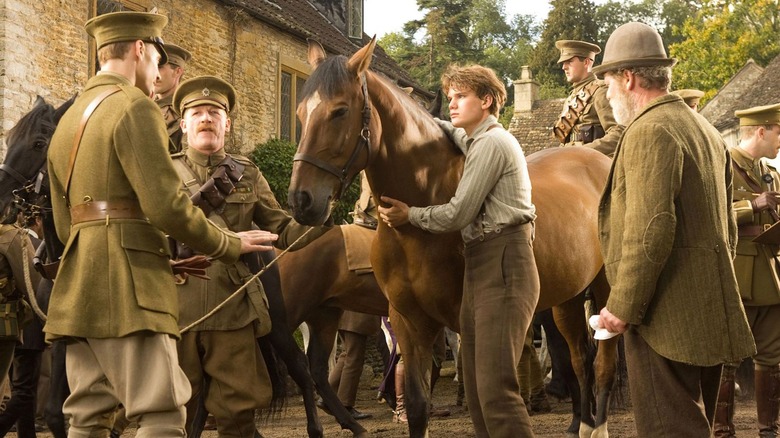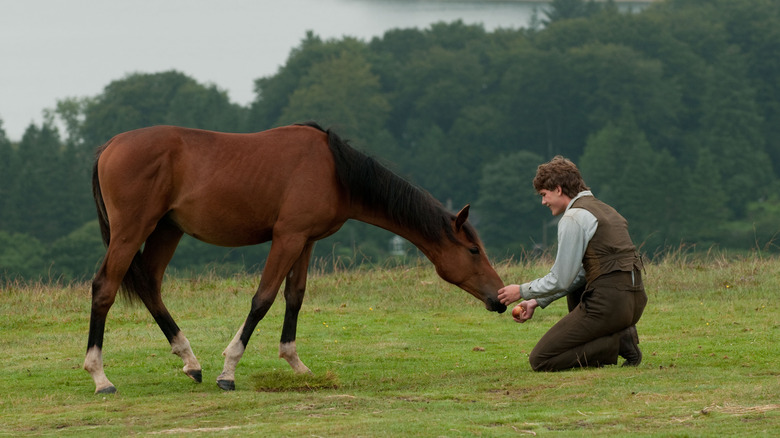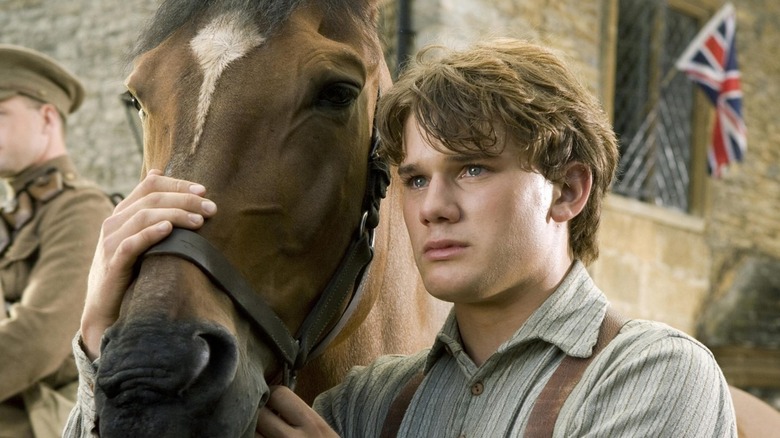Steven Spielberg Had Some Convenient Help Casting The Titular Role For War Horse
Steven Spielberg had already made at least two World War II classics in "Schindler's List" and "Saving Private Ryan" by the time he had made "War Horse" in 2011. (Six, if you count "Empire of the Sun," two "Indiana Jones" movies, and "1941" as WWII classics.) Throughout those movies, Spielberg seems to have stated very clearly the horrors and the evil prevalent about that conflict. He looked at the plight of persecuted Jews and life inside concentration camps. He explored the horrors of combat. He looked into an internment camp. He used Nazis as villainous stooges destined to be obliterated by God's wrathful might — twice. Only "1941" seems to make light of anything in and around the war.
It was curious, then, that "War Horse," a World War I film, should be so much lighter, tonally. "War Horse," about a young boy and the horse he loves, feels much more like a fairy tale than a war story. Employing a light, picaresque narrative, "War Horse" follows the titular horse, Joey — an Irish Hunter — as he aids his young owner, Albert (Jeremy Irvine), in revitalizing their farm, only to be swept up in the outbreak of the Great War. Joey and Albert are separated, and Joey goes on his own adventures. By the end, Joey and Albert are reunited just in time for a big hug-it-out moment. "War Horse" is an all-too-precious Hollywood weepie that lives and dies by the audience's attraction to Joey.
Casting Joey, it turns out, was a piece of cake for Spielberg, as producer Kathleen Kennedy — as she explained in a 2011 interview with the Hollywood Reporter — had already worked on the 2003 film "Seabiscuit." Joey and Seabiscuit were one and the same.
Joey is Seabiscuit
"Seabiscuit," also produced by Kennedy, was a 2003 film directed by Gary Ross ("The Hunger Games," "Free State of Jones") that was one of many films nominated for Academy Awards that year to be locked out by the clean sweep of "The Lord of the Rings: Return of the King." Out of seven nominations, "Seabiscuit" won zero. Because of the overwhelming amount of horse action in that film, however, the animal wrangling department was among the film's biggest. She recalled the enormous "Seabiscuit" animal department with clarity:
"That was one of the biggest departments on the film, with 200 to 300 people. You'd sometimes have as many as 180 to 280 horses in a scene. You'd have groomers and drivers to haul the horses and the feed, people to set up portable barns, vets and everyone else who handled the tack and the horses' makeup."
Kennedy, having already worked with such a large wrangling division, was able to parlay her connections directly into Spielberg's film, accessing many of the same horses for horse auditions. As it turns out, the horses for "Seabiscuit" were bought for use in the film and then sold off to trainers. One of the trainers, however, still had one of the Seabiscuit horse actors, and that horse was good enough. Kennedy and the trainer reunited, and Joey was cast.
"We had bought horses for 'Seabiscuit,' then we sold them — and Bobby Lovgren, our lead trainer [on 'War Horse'], bought Finder. He turned out to be one of the best horses Bobby had ever worked with, so he brought Finder with him to England."
Finder's keepers
According to The Hollywood Reporter, Joey was played by a total of 14 horses, with the above-mentioned Finder being the most visible. It's rare for a production of this size to rely on a single animal, especially when the horse in question plays such a large role.
Finder, previously known as Finders Key, once enjoyed an extensive write-up in The New York Times, which described the horse's failed career as a racer prior to becoming a Hollywood star. Finders Key's original owner, Curly Ortiz, was even quoted in the Times as saying that the horse was "not a gem in any sense." It appears that horses, no matter what their breeding or training, possess unique talents all their own. Finders Key may not have been a good racehorse — his 2002 racing form gives him very bad odds — but took very well to the camera.
In "War Horse," Finder (a new name for the screen) not only played Joey, but Joey's mother in an early birth scene. In addition to starring in "Seabiscuit" and "War Horse," Finder also appeared in Martin Campbell's "The Legend of Zorro," Tarsem's kooky fable "Mirror Mirror," and the 2010 Tony Scott film "Unstoppable." He was also in an episode of "CSI: Miami."
It seems Finder [puts on shades] is a horse of a different color. [The Who's "Won't Get Fooled Again" plays]


